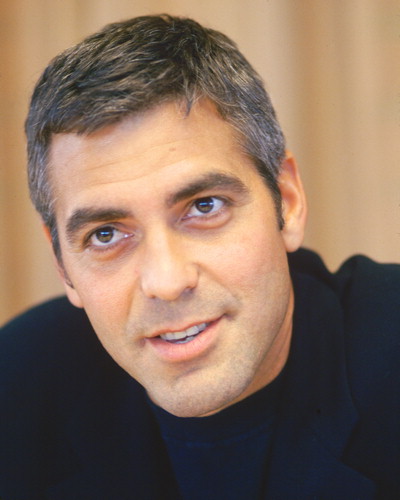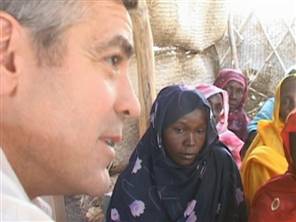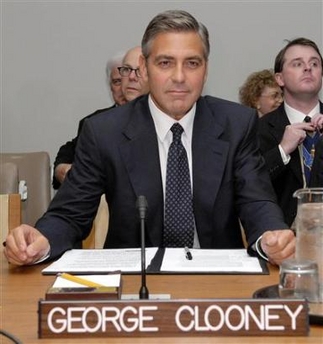
Not all stars are hooked only on the bright lights and the latest look. Some of them are using their celebrity to draw attention to the plight of others, says Geraldine Royds
George Clooney. Hollywood Star. Award winning actor, director and screenwriter. Twice voted Sexiest Man Alive. Famous for his close friendships and his bachelor pad in Italy.
But there is a less familiar side to Mr Clooney. Human Rights advocate. United Nations Messenger of Peace, Nobel Peace Summit Award recipient and co-founder of 'Not on Our Watch',a focus group drawing attention to atrocities around the world.
Clooney enjoys his stardom and wealth as much as the next guy in Hollywood - 'F*** it, I love my house in Italy. It's big and audacious and ridiculous, and nicer than any human being has the right to have,' he cheerfully told the Guardian newspaper. '(But) I have Irish Catholic guilt and want to make up for my successes.' (Read more)
George Clooney didn't achieve fame until his 30s, when he played in the hit TV series ER. By 2000 he was established as one of the most bankable stars in the world, respected as an active humanitarian prepared to lend his name to a range of causes.
In 2003, Clooney spoke out against the invasion of Iraq. He was viciously attacked from the Right and accused of being a traitor to his country. 'All I had done at that point was say, “Well, I think we have some questions to ask before we send 150,000 kids to get shot at”,' Clooney says.
He starred as
a disillusioned CIA Agent in Syriana,
a thriller about the shady world of the Middle Eastern oil industry and then he
wrote and directed Good Night and Good Luck, a story of journalistic courage during
the communist witch-hunts of the 1950s McCarthy era.
 Then Clooney got
interested in Darfur. He had been reading about the lack of
attention being given to the crisis, so in 2006 he and his father, the television
journalist Nick Clooney, went to see the devastation for themselves.
Then Clooney got
interested in Darfur. He had been reading about the lack of
attention being given to the crisis, so in 2006 he and his father, the television
journalist Nick Clooney, went to see the devastation for themselves.
Despite having a 14-year-old border guard shove a gun in his chest, catching malaria and being helicoptered out of Chad in a sandstorm a few days before the town was sacked, Clooney returned to the US as a committed advocate for action in the region.
He addressed a rally in Washington, lobbied the Senate and spoke before the U.N. Security Council. He made a trip to China and Egypt to ask both governments to pressure Sudan's government. He made two documentary films A Journey to Darfur, and Sand and Sorrow which highlight the plight of refugee's and he appears in another documentary Darfur Now.
In 2007,
George Clooney co-founded 'Not on Our Watch' a non-profit organization that
focuses on Darfur's
people and has raised millions for the area.
'You hope that somehow ... if you just shine a
really bright light on these things it's harder to get away with it,' Clooney says. 'It seems as
if at times celebrity can bring that focus. It can't make the policies; it
can't change people's minds really. But you can bring a camera where you go
because they'll follow you and  you can shine a light on it. That seems to be my
job in this.'
you can shine a light on it. That seems to be my
job in this.'
He received the Nobel Peace Summit Award in 2007 for his extensive work to end the suffering in Sudan and this year the UN publicly recognized his work. He has a UN passport.
'It says "Messenger of Peace" on it,' George commented. 'It's very cool.'
Many people think George Clooney is very cool too.
